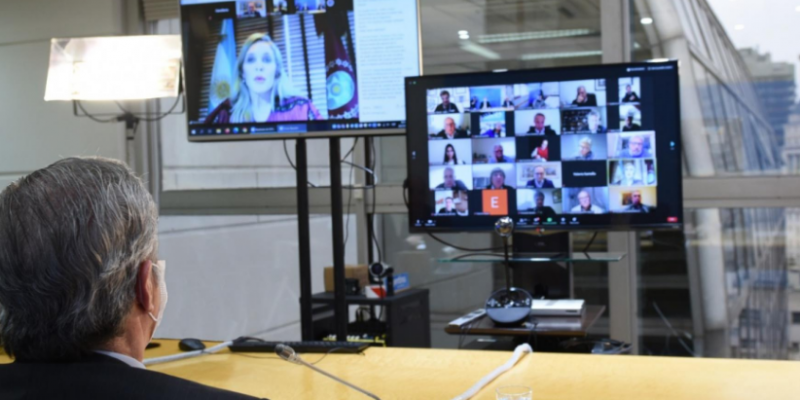Launched the Public-Private Council for the Promotion of Exports | GEMERA
- Home
- Sin categoría
- Launched the Public-Private Council for the Promotion of Exports

- 0 Comments
- Gemera
- 23/07/2020
It is composed of more than 180 business chambers and aims to articulate the dialogue between the government and business to formulate a national export policy.
With the participation of more than 180 business chambers of active intervention in foreign trade, Foreign Minister Felipe Solá yesterday led the launch of the Public-Private Council for the Promotion of Exports, the institutional space that will permanently articulate the dialogue between the government and business to formulate a national export policy.
Solá highlighted the need for a partnership between companies and «a State that helps, that is in good times and in bad, that understands the problems, of the sector, of the region, of the product or of the market». «We do not decide what is exported or how it is exported, but we know where the possibilities are and what they need, and promote an export from the bottom up. We have to identify key markets with you. Let the world know what the definition of Argentina’s exportable supply is,» he said.
«We have exports that are very concentrated in products and markets and we want to expand the number of exporting firms,» Solá said, presiding over the launch of this organization, created by Resolution 136/2020 of the Ministry of Foreign Affairs, International Trade and Worship, together with the Secretary of International Economic Relations, Jorge Neme.
«We are aware of the know-how you have, your export history and the export eagerness of many who do not, and we consider Argentina’s capacity to react very important,» the Minister told the representatives of the sectorial chambers.
During the meeting, which was moderated by the Undersecretary of Trade and Investment Promotion, Pablo Sívori, the President of the CIARA-CEC Board of Directors, Gustavo Idígoras; the President of the Industrial Union of Salta and member of the Board of Directors of the UIA, Paula Bibini and the General Manager of INVAP S.E., Vicente Campeni, also spoke.
«We welcome the decision of the Ministry of Foreign Affairs to constitute the National Council, dedicated to promoting all export policies. We are committed every day to generate more work, more production and more exports. This is the path in which we will continue to work together with the Government with this public-private articulation, to open more markets, increase volumes and counteract the para-tariff and tariff barriers that exist against Argentina’s added value worldwide,» said Gustavo Idígoras after the meeting.
Likewise, the head of CIARA-CEC, considered that «the reason of being is the access to international markets» and pondered the Council as «the institutional place» and the «natural environment» to deal with problems such as «sanitary barriers, veterinary products issues, new measures, environmental and social issues».
For his part, Neme welcomed the presence of «nearly 189 people representing thousands of companies» at the launch of the Council and praised «the institutional frameworks, which make public policies last».
«We believe that this public-private articulation is key to improve the competitiveness of the Argentine export sector, to seek new markets, to organize the export offer and to give international relevance to the Argentine brand,» he said.
The head of international economic negotiations at the Foreign Ministry also said that «Argentina is the only country in the world that has reduced the number of companies that export and it is the responsibility of the private and public sectors to turn this situation around. He also explained the need to «find an operational mechanism to work with the set of associations and chambers that are present.
Neme proposed an initial sectorization of fourteen sectors (regional economies, fisheries, cereals and oilseeds, processing industry, meat, capital goods, fruit, chemical industry, mining and oil, cultural industries, food industries, new technologies and services, automotive sector, clothing) and announced that the Secretariat will appoint specialized officials to operate as liaisons for each of the tables along with a representative of the private sector.
